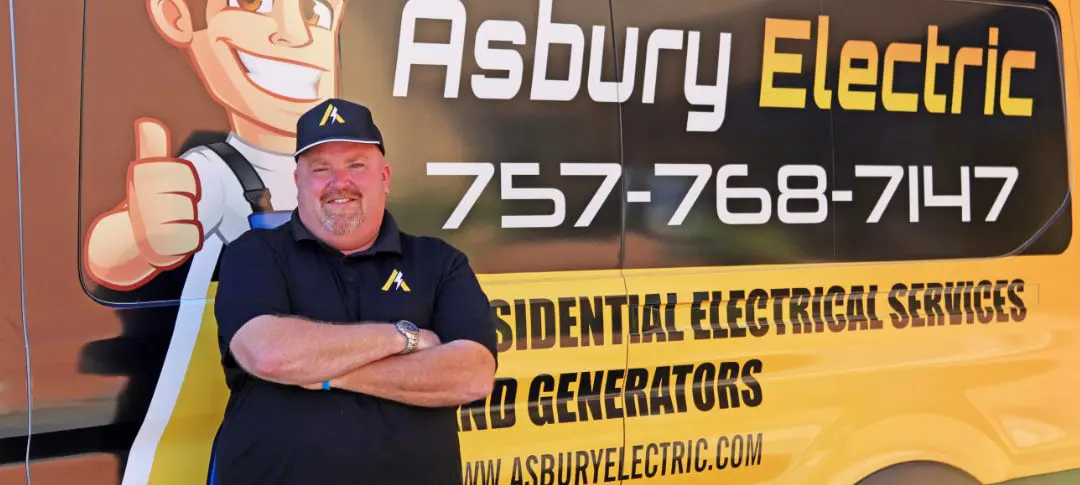Asbury Electric understands how important your family is. You want the best for them in terms of safety. You have likely taken measures to ensure that your home is equipped to keep them safe, for instance, by installing spotlights or GFCI outlets. To protect everyone in your home from fires and electrocution, you have smoke detectors and other devices that alert you of an electrical fault.
When it comes to safety, there are no shortcuts. If you want to take your home’s safety one step further, install a carbon monoxide detector. Smoke detectors must be installed in each house; however, a carbon monoxide detector can provide additional safety to you and your family.
What Is Carbon Monoxide?
Carbon monoxide is an odorless, colorless, and tasteless gas. It is one carbon atom bonded to one oxygen atom. Carbon monoxide is usually present in oxygen-deficient environments, and it can leak from a faulty appliance.
If you’re exposed to CO, you could experience confusion, dizziness, headaches, fatigue, irregular breathing, chest pains, nausea, and vomiting. Carbon monoxide poisoning is fatal within minutes. Carbon monoxide is also known as the silent killer since you are unaware of its presence until it has already poisoned you.
Where Does Carbon Monoxide Come from In My Home?
Many of your appliances release carbon monoxide, like stoves, dryers, water heaters, furnaces, and fireplaces. Your car produces carbon monoxide, so your garage can be a hotspot for carbon monoxide poisoning.
It’s essential to use all these appliances in a well-ventilated area. Rooms without open windows become oxygen-deficient. In this case, these appliances are now forced to produce carbon monoxide.
What Is a Carbon Monoxide Detector?
Since carbon monoxide is colorless, tasteless, and odorless, it is extremely difficult to detect. Unlike smoke, you can’t see carbon monoxide if there is a leak. That is why it’s important to install carbon monoxide detectors around your home to ensure that you’re notified if carbon monoxide is present.
Types of Carbon Monoxide Detectors
Biomimetic Sensor
This sensor has a gel that replicates the blood cells in your body. Since carbon monoxide enters your blood and poisons your organs, a biomimetic sensor’s gel will change color as the CO is absorbed. The sensor will then alert the processor and sound the alarm.
Metal Oxide Sensors
When CO comes into contact with the circuit in a metal oxide sensor, it lowers the resistance. This change is detected by a processor, which then sets the alarm off. These sensors rely on an electrical outlet instead of batteries.
Electrochemical Sensors
An electrochemical sensor has electrodes in a chemical solution that detects a change in the flow of current between them. This sensor will instantly detect the presence of carbon monoxide in your home.
What’s the Difference Between a Carbon Monoxide Detector and A Smoke Detector?
Smoke detectors are explicitly designed to detect smoke. It achieves this by sensing heat, fire, or smoke. Carbon monoxide detectors only detect carbon monoxide, which may not be present in a case of fire. It is vital to have both of these devices in your home, whether your home is old or new.
What’s the Difference Between a CO Detector and CO2 Detector?
A CO2 detector uses infrared sensing, while a CO detector uses various other sensors. Both are vital to prevent oxygen displacement in a space. However, CO2 detectors are not required in residential homes and do not detect carbon monoxide gas, which is the biggest concern when it comes to safety in your home.
Ways to Prevent Carbon Monoxide Poisoning
The best prevention method is to have a professional CO detector installation. If your home has multiple levels, a carbon monoxide detector must be placed on each one. Change the batteries of your carbon monoxide detector every 6 to 12 months. When running motors, like generators or vehicles, run them outside your home or in a well-ventilated space. For instance, keep your garage door open when your car runs for an extended period.
When purchasing new appliances, make sure that it has the American Gas Association seal of approval and have them inspected regularly confirm that they are up to standard. Install an exhaust fan in your home if you are using gas-powered appliances.
Where Should a Carbon Monoxide Detector Be Placed?
Since smoke rises, smoke detectors are usually placed high up on your wall. However, carbon monoxide is heavier than oxygen, which means it sinks to the bottom of your room. Therefore, we use a very sensitive CO and smoke detector that mounts up high and can detect the heavier gas before it can seriously harm you.
If you decide to install your own CO detectors, please ensure that your carbon monoxide detector is not hidden behind doors or curtains, as this can prevent the device from functioning. Keep the carbon monoxide detector out of reach of children and pets, as well.
Smoke Detectors
Even though it is a requirement by law to have a smoke detector in your home, some older buildings may not have them. If your home does not have a carbon monoxide or smoke detector, contact a local electrician immediately.
There are two main kinds of smoke detectors.
Photoelectric
A photoelectric smoke detector uses an internal photocell that responds to a reduction of light. Less light is detected when smoke enters the device, causing it to sound the alarm. This detector has a quick response time. The chances of a photoelectric smoke detector sending out a false alarm are much lower than with other detectors. However, if the batteries are dead, it will not notify you of a fire. It is vital to test them regularly to ensure that they work.
An ionization smoke detector has two electrodes with current constantly flowing between them. When smoke enters the device, it stops the current from flowing between the electrodes and causes the alarm to go off. Unfortunately, if steam enters the unit, it can interrupt the current and then sound the alarm. That is why it is not ideal to place these kinds of smoke detectors near kitchens or bathrooms. They are incredibly sensitive and may even sound the alarm for something as small as burning food. However, ionization smoke detectors are cheaper to install and have a faster response to flaming fires than photoelectric smoke detectors. These detectors will also sound the alarm when the batteries die.
Get electrical maintenance regularly for smoke detectors and carbon monoxide detectors to make sure both devices are in 100% working order. While you’re at it, schedule an electrical inspection as well. In this way, an electrician can test the electrical safety of your home so that each of your detectors can work as it should. If there is a fault in your electrical system, your smoke detector and carbon monoxide detectors may not work properly.
CO Detector Installation Services
While there are types of CO detectors that you can install yourself, hiring a professional electrician will ensure your detector is installed correctly.
Why Do I Need a Professional CO Detector Installation?
An electrician can assess your home’s layout and advise you on correct placement. Your electrician will know the current safety standards for your detector and verify that your installation complies with those requirements.
An electrician will also test the detector, so you can be confident it will work when you need it to. It can be difficult to know if you installed this device properly, so hiring an installation expert for your CO detector helps support the safety of your home and family.
Battery-Powered CO Detectors vs. Interconnected CO Detectors
You have a choice between battery-powered CO detectors and hardwired models. Battery-powered CO detectors are a cost-effective choice, but they require regular checks to confirm your device will have power when you need it. Battery-powered CO detectors don’t communicate with each other, so if you own a multistory home, a lone alarm may be difficult to hear.
A hardwired co detector installation helps monitor your entire home. If one detector senses carbon monoxide, all of the interconnected detectors will sound an alarm, alerting you to the danger no matter where you are in your home. Since a hardwired system is connected to your existing electrical system, you won’t have to worry about changing batteries to keep your detectors functioning properly.
If you choose a hardwired system, you’ll want to schedule a professional carbon monoxide detector installation. Working with a trained electrical contractor will prevent installation mistakes and help keep your home’s electrical system safe. That is why we suggest expert assistance from Asbury Electric.
What You Can Expect From Our Service
When you choose Asbury Electric, you’ll receive professional services from local, licensed electricians. Your electrician will arrive ready to begin your installation with a fully stocked truck.
We’ll provide honest pricing so you can make an informed decision, and we guarantee you’ll be 100% satisfied with your service.
From our location near the Gloucester Courthouse, we serve all three Virginia Peninsulas. Choose us for your CO detector needs in Virginia Beach, Newport News, Hampton, Williamsburg, Northern Neck and Gloucester County.
Reliable Local Electricians Are Just a Phone Call Away
For trustworthy carbon monoxide detector installations, contact Asbury Electric. We offer 24-hour electrical safety services for any emergency. Our electricians are licensed and qualified to work with your home’s electrical systems.
Our team will ensure that you are completely satisfied with our services. At Asbury Electric, we believe in showing our customers the highest respect by arriving on time and leaving their homes in neat condition. Call today or submit a service request form, and we’ll contact you.

